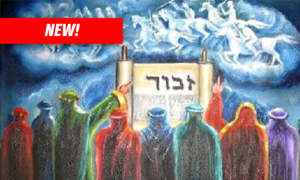Introduction
In the reading of Terumah we read about G-d’s command to build the Tabernacle and the holy vessels. When the building is complete, the Divine Presence will rest there (Source 1).
A. Guarding the Temple
The Temple must be guarded; not for security but out of respect (Source 2). The honor guard isn’t for the brick and mortar building, but for the Divine Presence. Therefore, the most distinguished people—the priests and the Levites—were chosen as guards. Since the holiness of the Temple is eternal, it would seem that the honor guard ought to continue even after its destruction. [Optional: If reverence for the Temple, a positive commandment, is still in effect after the destruction (Source 3), certainly the negative and positive commandment to guard the Temple is still binding.]
B. Must we Guard the Temple Nowadays?
Why has this never been done? The Chabad leaders were very active in strengthening the Jewish community in Israel, but they never tried restoring this mitzvah. Why?
Moreover, even if this mitzvah isn’t binding today, when Moshiach comes and the Temple is rebuilt it will be in force again. Shouldn’t we establish a guard already now?
C. Saving A Life Overrides the Honor Guard
Even today, when the Temple Mount is under Jewish rule, and there are peace agreements in place, there is still a fear of extremist “lone wolf” attacks. Therefore, from the time of the destruction of the Temple until today, we do not fulfill this commandment.
D. Guarding the Temple in a Spiritual Sense
In a spiritual sense, building the Temple means making one’s own home a temple for G-d; a place where one learns Torah and does mitzvot.
Similarly, the mitzvah of guarding the Temple is still applicable in the spiritual sense. When a child cherishes their holy books and respects them, that is guarding the Temple. When a person respects the holy aspects of their life and their holy objects—more than their other possessions—they fulfill the spiritual application of this mitzvah.






